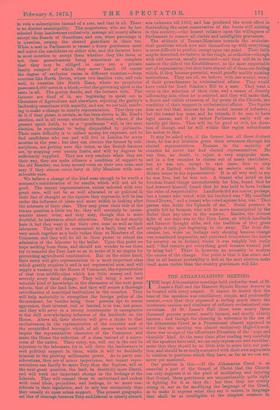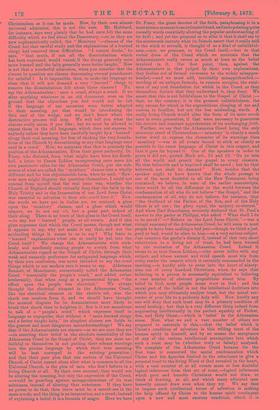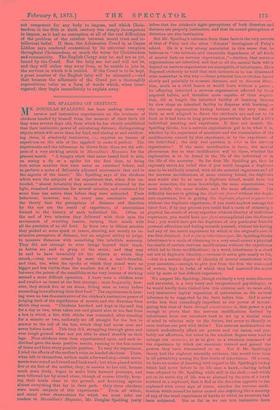Christendom as it can be made. Now, by their own
almost universal admission, this is not the case. Mr. Hubbard, for instance, says very plainly that he had once felt the same difficulty which we feel about the Damnatory,—or, as they are now euphemistically called, the "Monitory "—clauses of the Creed, but that careful study and the explanations of a learned clergy had removed these difficulties. "I cannot doubt," he says, "that much, if not all the dissatisfaction which has been expressed, would vanish if the clergy generally were more learned and the laity generally were better taught." Now is not that a wonderful admission, when you consider that the clauses in question are clauses denouncing eternal punishment for unbelief Is it impossible, then, to make the language so clear that it will not demand a very " learned " clergy to
remove the dissatisfaction felt about these clauses No,' say the Athanasianists ; 'once a creed, always a creed. If we alter anything whatever in an old document, even on the ground that the objections you feel would not be felt if the language of our ancestors were better adapted to their meaning, yet that would be introducing the thin end of the wedge, and we don't know where the destructive process will stop. We will tell you what the clauses really mean, if you like ; but we must be allowed to repeat them in the old language, which does not express to anybody unless they have been carefully taught by a 'learned' clergy their real meaning, for fear of shaking the very founda- tions of the Church by discontinuing at any time language once used in a creed.' Now, we maintain that that is precisely the position of the Athanasianists. Even their great authority, Dr. Pusey, who dictated, from what might have been his death- bed, a letter to Canon Liddon re-expressing once more his own passionate value for the Athanasian Creed, put the sub- stance of what are called the "monitory" clauses into a wholly different and far less objectionable form, when he said, "How- ever men might disguise the question themselves, I could not conceal from myself that the real issue was, whether the Church of England should virtually deny that the faith in the Holy Trinity and in the Incarnation of our Lord Jesus Christ was essential to salvation in those who could have it." Now, the words we have put in italics are, we contend, a gloss upon the 'monitory' clauses, and a gloss which would remove, we do not say all, but a great part indeed of -their sting. There is no trace of that gloss in the Creed itself, —to any but " learned " people, at all events. And if this gloss expresses that which the Creed means, though not what it appears to say, why not make it say that, and not the misleading things it seems to us to say ? Why leave to " learned " explanations what can so easily be put into the Creed itself ? We charge the Athanasianists with reck- lessly and needlessly causing people to shrink from what Athanasianists regard as the Gospel of Christ, through their weak and unmanly preference for antiquated language which, by their own confession, was never intended to say the cruel things which to our modern ears it seems to say. Alderman Bennett, of Manchester, eccentrically called the Athanasian Creed "essentially the people's creed," and added, rather irrelevantly, that when sung as a processional hymn "the effect upon the people was electrical." We always thought the electrical element in the Athanasian Creed, like the electrical element in the electric eel, was the shock one receives from it, and we should have thought the musical disguise for its denunciations more likely to break that shock than to heighten it. But is it not monstrous to talk of a "people's creed" which expresses itself in language so unpopular, that without a "more learned clergy and a better taught laity," its simplest clauses are liable to the gravest and most dangerous misunderstandings We say that if the Athanasianists are sincere—as we are sure they are —in asserting their belief in the absolute essentiality of the Athanasian Creed to the Gospel of Christ, they are most un- faithful to themselves in not putting their solemn warnings into the precise language by which their true meaning will be best conveyed to the existing generation ; and that their poor plea that one section of the Universal Church of Christ cannot alone alter what is common to all the Universal Church, is the plea of men who don't believe in a living Church at all. By their own account, they would not be altering the meaning, but only the expression of the Creed, —would be guarding against misapprehensions of its true substance, instead of altering that substance. If they have no power to do that, then there must be a sacredness in the mere words; and the thing is an incantation, not a creed; instead of explaining a belief, it is a formula of magic. Here we have Dr. Pasey, the great devotee of the faith, paraphrasing it in a most solemn moment to an intimate friend, and interpolating quite casually words essentially altering the popular understanding of its drift ; and yet the proposal so to alter it that it shall say to the nineteenth century what its friends assert that it really said to the sixth or seventh, is thought of as a kind of unfaithful- ness,—not, we presume, to the Creed itself,—but to that. verbal dress of the Creed which we maintain that the Athanasianists really revere as much at least as the belief- involved in it. Our first point, then, against the Athanasianists is, that judged by their own explanations, they decline out of formal reverence to the widely misappre- hended,—and we must add, inevitably misapprehended,— wording of an antique formula, to remove scruples, the exist- ence of any real foundation for which in the Creed, as they themselves declare that they understand it, they deny. We assert that this is not faithfulness to the Gospel of Christ ;- that, on the contrary, it is the grossest unfaithfulness, the only excuse for which is the superstitious clinging of use and custom to familiar, but not the leas misleading, words. A really living Church would alter the form of its mere words once in every generation, if that were necessary to guarantee the correct and constant apprehension of its unchanging faith. Further, we say that the Athanasian Creed being the only minatory creed of Christendom—' minatory' is clearly a much better word to express the character of its warnings than monitory '—was at all events bound to stick as closely as possible to the exact language of Christ in this respect, and that it goes far beyond it. One of the speakers in order to prove it did not, quoted Mark xvi., 15 and 16, "Go ye into all the world, and preach the gospel to every creature. He that believeth and is baptized shall be saved ; but he that believeth not shall be damned." Now, besides that the speaker ought to have known that the whole passage is one of the most doubtful in all the New Testament, being contained, we believe, in none of the earlier manuscripts, there would be all the difference in the world between the condemnation of all who do not believe "the Gospel," and the condemnation of all who do not believe, for instance, that "the Godhead of the Father, of the Son, and of the Holy Ghost is all one ; the glory equal, the majesty co-eternal." And when Earl Beauchamp seriously declared that St. Paul's answer to the gaoler at Philippi, who asked "What shall I do to be saved ?"—" Believe on the Lord Jesus Christ,"—was a virtual summary of the Athanasian Creed, he will seem to most people to have been making a bad jest—though we think a jest, good or bad, would be alien to him—on a very serious subject. Just conceive the gaoler's dismay if, instead of that very short exhortation to a living act of trust, he had been warned by the recitation of the Athanasian Creed. Indeed it seems to us that Canon Liddon,—who never trifles with any subject, and whose earnest and vivid speech must win from every reader the respect which it certainly commanded in the meeting,—is hardly able to enter into the heart of ninety- nine out of every hundred Christians, when he says that believing in a person is necessarily equivalent to believing a vast number of abstract propositions about him. By belief in God, most people mean trust in God ; and the moral part of the belief is not the intellectual doctrines-into which you may ultimately analyse trust, but the moral sur- render of your life to a perfectly holy will. Now, hardly any one will deny that such trust may be a primary condition of moral healing ; but that is a very different thing indeed from acquiescing intellectually in the perfect equality of Father, Son, and Holy Ghost,—which is ' belief ' in the Athanasian sense. Now, what we and a vast number of others are prepared to maintain is this,—that the belief whiCh is Christ's condition of salvation is this willing trust of the human spirit in himself, and by no means the acceptance of any of the various intellectual assumptions into which such a trust may be (whether truly or falsely) analysed. We complain of the Athanasian Creed because for the first time it connected the moral condemnation which Christ and his Apostles limited to the reluctance to give a personal trust to the living Word of God revealed in the heart, with a vast number of at all events more or less doubtful logical inferences from that act of trust,—logical inferences which poor and humble Christians would not draw, or think of drawing, at all, and which many educated men honestly cannot draw even when they try. We say that to impose such intellectual terms of salvation is making the help offered by Christ to the human spirit contingent upon a new and most onerous condition, which it is not competent for any body to impose, and which Chris- tendom in the fifth or sixth century was simply incompetent to impose, as it had no conception at all of the real difficulties of the problem of the relation between moral trust and in- tellectual belief. If, then, the Athanasian Creed is, as Canon Liddon says, rendered ecumenical by its universal reception throughout Christendom, so much the worse for Christendom and ecnmenicity. The English Clergy may be, and are as yet, bound by the Creed. But the laity are not and will not be, and they will either stay away from, or be unable to join in, the services in which it is recited. If the Creed is to be kept, a great number of the English laity will be alienated ;—and that because the adherents of the Creed put a thoroughly superstitious value on a form of words which, when inter- rogated, they begin immediately to explain away.




































 Previous page
Previous page